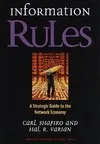Information Rules: A Strategic Guide to the Network Economy
4.5
Reviews from our users

You Can Ask your questions from this book's AI after Login
Each download or ask from book AI costs 2 points. To earn more free points, please visit the Points Guide Page and complete some valuable actions.Introduction to 'Information Rules: A Strategic Guide to the Network Economy'
Welcome to a comprehensive exploration of 'Information Rules: A Strategic Guide to the Network Economy' by Carl Shapiro and Hal R. Varian. This book is a timeless examination of the economics underlying the digital landscape, providing valuable insights and strategic frameworks for navigating the complex dynamics of the information age. Shapiro and Varian draw upon economic theory and practical insights to help businesses and individuals understand the foundational principles that govern the rapidly evolving network economy.
Detailed Summary of the Book
'Information Rules' distills the essence of information economics, where data and its implications drive the modern market. The book presents a blend of classical economic thought and innovative perspectives on digital markets. Shapiro and Varian aim to demystify the behaviors of these markets, offering robust strategic tools for decision-making.
At the heart of the text is the concept that information is costly to produce but cheap to reproduce. This dual characteristic of high fixed costs and low marginal costs is pivotal to understanding the behavior of information goods. The authors elucidate a variety of economic principles including network effects, switching costs, and lock-in strategies, which help organizations leverage market positions.
Shapiro and Varian detail how traditional principles like pricing, versioning, and product differentiation translate into the context of information goods. The analysis extends to include considerations of industry structure, competition, and the impact of technological advancements. The book serves as an invaluable guide for business leaders, economists, and strategists seeking to gain a competitive edge in the network economy.
Key Takeaways
- Understanding that information goods exhibit high fixed and low marginal costs, which influences pricing models and competitive strategies.
- The significance of network effects in boosting the value of information goods as the user base expands.
- Strategies for managing and leveraging switching costs to create customer lock-in.
- Importance of versioning and product differentiation in capturing diverse customer segments.
- Insights into how traditional economic principles apply in nuanced ways to the digital economy.
Famous Quotes from the Book
"Technology changes. Economic laws do not."
"The information economy rewards first mover advantages, but they are fleeting."
"In information markets, value is determined not by physical scarcity, but rather by usefulness."
Why This Book Matters
'Information Rules' remains a seminal work in the field of information economics, offering timeless insights despite the rapid pace of technological change since its publication. The book's relevance today stems from its foundational exploration of principles that continue to shape how businesses operate in our interconnected world.
The authors effectively bridge the gap between economic theory and practical application, equipping readers with a robust toolkit for navigating the complexities of digital markets. By elucidating concepts such as network effects, strategic pricing, and customer lock-in, Shapiro and Varian empower readers to better grasp the strategies essential for thriving in a network economy.
In a world increasingly driven by data and connectivity, understanding the dynamics articulated in 'Information Rules' offers competitive advantage and strategic foresight. Whether for entrepreneurs, business strategists, or students of economics, this book is a pivotal resource for comprehending how economic principles intersect with digital innovation.
Free Direct Download
You Can Download this book after Login
Accessing books through legal platforms and public libraries not only supports the rights of authors and publishers but also contributes to the sustainability of reading culture. Before downloading, please take a moment to consider these options.
Find this book on other platforms:
WorldCat helps you find books in libraries worldwide.
See ratings, reviews, and discussions on Goodreads.
Find and buy rare or used books on AbeBooks.
1363
بازدید4.5
امتیاز50
نظر98%
رضایتReviews:
4.5
Based on 0 users review
"کیفیت چاپ عالی بود، خیلی راضیام"
Questions & Answers
Ask questions about this book or help others by answering
No questions yet. Be the first to ask!


